Related Research Articles

The Indonesian National Armed Forces are the military forces of the Republic of Indonesia. It consists of the Army (TNI-AD), Navy (TNI-AL), and Air Force (TNI-AU). The President of Indonesia is the commander-in-chief of the Armed Forces. As of 2023, it comprises approximately 400,000 military personnel including the Indonesian Marine Corps, which is a branch of the Navy.

East Java is a province of Indonesia located in the easternmost third of Java island. It has a land border only with the province of Central Java to the west; the Java Sea and the Indian Ocean border its northern and southern coasts, respectively, while the narrow Bali Strait to the east separates Java from Bali by around 2.29 kilometres (1.42 mi). Located in eastern Java, the province also includes the island of Madura, as well as the Kangean islands and other smaller island groups located further east and the Masalembu archipelago to the north. Its capital is Surabaya, the second largest city in Indonesia, a major industrial center and also a major business center. Banyuwangi is the largest regency in East Java and the largest on the island of Java.

Central Java is a province of Indonesia, located in the middle of the island of Java. Its administrative capital is Semarang. It is bordered by West Java in the west, the Indian Ocean and the Special Region of Yogyakarta in the south, East Java in the east, and the Java Sea in the north. It has a total area of 33,750.37 km2, with a population of 36,516,035 at the 2020 Census making it the third-most populous province in both Java and Indonesia after West Java and East Java. The official population estimate in mid-2023 was 37,608,336 The province also includes a number of offshore islands, including the island of Nusakambangan in the south, and the Karimun Jawa Islands in the Java Sea.

The Java War or Diponegoro War (ꦥꦼꦫꦁꦢꦶꦥꦤꦼꦒꦫ) was fought in central Java from 1825 to 1830, between the colonial Dutch Empire and native Javanese rebels. The war started as a rebellion led by Prince Diponegoro, a leading member of the Javanese aristocracy who had previously cooperated with the Dutch.
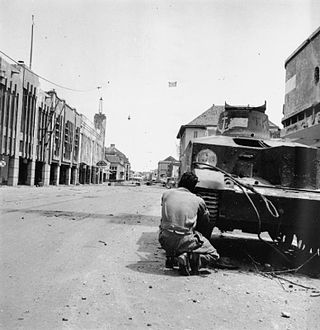
The Battle of Surabaya was a major battle in the Indonesian National Revolution fought between regular infantry and militia of the Indonesian nationalist movement and British and British Indian troops against the re-imposition of Dutch colonial rule. The peak of the battle was in November 1945. The battle was the largest single battle of the revolution and became a national symbol of Indonesian resistance. Considered a heroic effort by Indonesians, the battle helped galvanise Indonesian and international support for Indonesian independence. 10 November is celebrated annually as Heroes' Day.

Oemar Said Tjokroaminoto, better known in Indonesia as H.O.S. Tjokroaminoto, was an Indonesian nationalist. He became one of the leaders of the Islamic Trade Union, founded by Samanhudi, which became Sarekat Islam, which they both cofounded.

The Trans-Java Toll Road is a tolled expressway network that runs from Port of Merak in Cilegon, the main link between the island of Sumatra and Java, to Banyuwangi, the eastern end of the island in Indonesia and the main link between the island of Java and Bali. It mainly runs through the northern coast of the island, except for the section between Semarang and Surabaya, where it runs through the centre and south of the island. It runs through five of the six provinces on the island of Java, connecting the major cities of Jakarta, Cirebon, Semarang, Solo, and Surabaya. The toll road is the land transportation backbone of the island and is the most important toll road network of the country. The toll road has a total length of 1,167 kilometres (725 mi).

Achmad Soebardjo Djojoadisoerjo was a diplomat, an Indonesian national hero, and the first foreign minister of Indonesia.

Major General Moestopo was an Indonesian military officer, revolutionary and educator, and military figure in the Indonesian War of Independence.
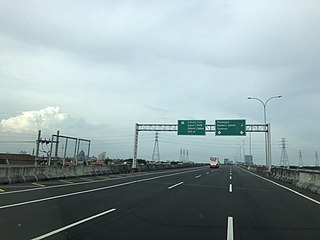
Surabaya–Mojokerto Toll Road or Sumo Toll Road, is a part of Trans-Java toll road in Java, Indonesia, that length of the toll road is 36.1 kilometres.
National Hero of Indonesia is the highest-level title awarded in Indonesia. It is posthumously given by the Government of Indonesia for actions which are deemed to be heroic, defined as "actual deeds which can be remembered and exemplified for all time by other citizens" or "extraordinary service furthering the interests of the state and people". The Ministry of Social Affairs gives seven criteria which an individual must fulfill, as follows:
- Have been an Indonesian citizen who is deceased and, during his or her lifetime, led an armed struggle or produced a concept or product useful to the state;
- Have continued the struggle throughout his or her life and performed above and beyond the call of duty;
- Have had a wide-reaching impact through his or her actions;
- Have shown a high degree of nationalism;
- Have been of good moral standing and respectable character;
- Never surrendered to his or her enemies; and
- Never committed an act which taints his or her legacy.
Pajonga Daeng Ngalle also known with his title Karaeng Polongbangkeng was the 12th Karaeng (ruler) of Polongbangkeng and Indonesian revolutionary figure from South Sulawesi. He was a son from Hajina Daeng Massaung Karaeng Ilangari Mangkura and Hapipah Daeng Ngintang, South Sulawesi aristocrats from Polongbangkeng.

The French and British interregnum in the Dutch East Indies of the Dutch East Indies took place between 1806 and 1816. The French ruled between 1806 and 1811, while the British took over for 1811 to 1816 and transferred its control back to the Dutch in 1816.

Mas Isman was an Indonesian freedom fighter in East Java when it was part of the Dutch East Indies. He received a National Hero of Indonesia award from President Joko Widodo on 5 November 2015.

Super East Java derby is the name given in football rivalries to any match between two Indonesian football clubs: Arema (Galatama) and Persebaya Surabaya (Perserikatan). The fierce competition between both teams began in 1992 when Arema and Persebaya Surabaya were grouped together in 1992 Piala HUT Arema.
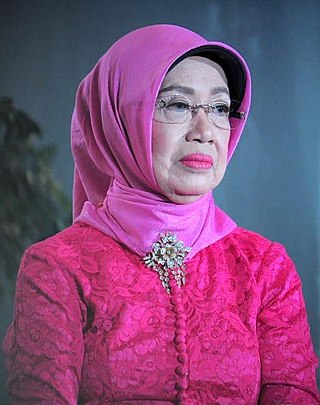
Sudjiatmi Notomihardjo was the mother of Joko Widodo, Indonesia's president from 2014. Along with her husband, Widjiatno Notomihardjo, she was a wood trader from Solo.
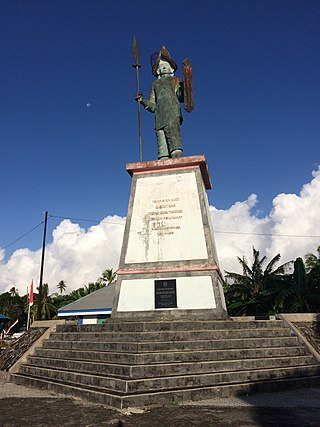
Don Jugov Santiago, popularly known as Bataha Santiago, was the third king of Manganitu Kingdom in Sangihe Islands of modern-day Indonesia. He ruled from 1670 until his death in 1675 and is known for his opposition to opening relations with the Dutch, which resulted in his deposition and execution. He was awarded title National Hero of Indonesia in 2023.
2023 (MMXXIII) was a common year starting on Sunday of the Gregorian calendar, the 2023rd year of the Common Era (CE) and Anno Domini (AD) designations, the 23rd year of the 3rd millennium and the 21st century, and the 4th year of the 2020s decade.
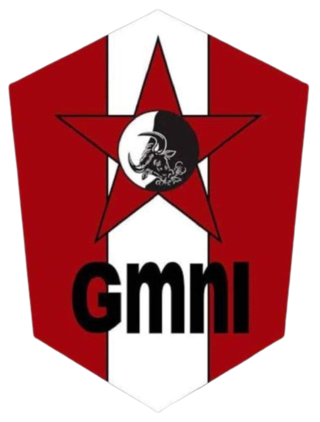
The Indonesian National Student Movement is one of the extracampus student organisations found in almost all parts of Indonesia, especially cities or regencies with universities. GMNI was established on 23 March 1954 in Surabaya. GMNI is an organisation resulting from the merger or fusion of three previously established student organisations; the Marhaen Student Movement, the Free Student Movement, and the Indonesian Democratic Student Movement.
Ahmad Sanusi was an Indonesian Islamic scholar, nationalist, freedom fighter, and member of Investigating Committee for Preparatory Work for Independence. He was also co-founder of Islamic Community Unity.
References
- 1 2 3 Hidayat, Rachmat, ed. (2014-11-07). "Profil HR Mohamad Mangoendiprodjo – Tribunnews.com". Tribunnews.com (in Indonesian). Retrieved 2018-11-07.
- 1 2 Putra, Yudhistira Dwi. "HARI PAHLAWAN: Mangundiprojo, Darah Kepahlawanan dan Perjuangan di Surabaya". Okezone News (in Indonesian). Retrieved 2018-11-07.
- 1 2 "Presiden Jokowi Beri Gelar Pahlawan Nasional untuk 4 Orang". detiknews. Retrieved 2018-11-07.
- ↑ Asril, Sabrina (2014-11-07). Permana, Fidel Ali (ed.). "Ini Profil Empat Tokoh yang Diberikan Gelar Pahlawan Nasional oleh Presiden Jokowi – Kompas.com". KOMPAS.com. Retrieved 2018-11-07.